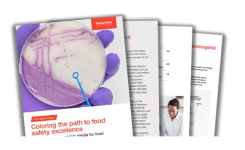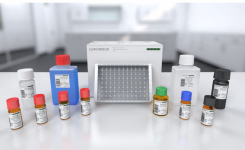Neogen's Soleris® Detects Yeast and Mold in 48 hours or Less
go back to news archives| Neogen Corporation has developed an even quicker method to rapidly and accurately detect yeast and mold in food products. Neogen´s new Soleris® test detects yeast and mold in 48 hours or less conventional methods take up to 5 days. The new test is a Soleris direct vial system that can detect one colony forming unit (CFU) of yeast or mold per sample vial in 48 hours or less 24 hours faster than the previous rapid yeast and mold assay, and days faster than most tests. Neogen´s new test also requires less technician time. The Soleris system is a rapid optical method for the detection of microbial contamination based on an innovative application of classic microbiology. Soleris enables operators to release products quicker, saving the organization inventory costs, and allows operators to easily identify, monitor, and map problematic spots in their facilities. In addition to the yeast and mold test, Neogen´s Soleris system provides the quickest automated quality indicator tests for:
|
NOTE: This item is from our 'historic' database and
may contain information which is not up to date.
Source : Neogen Corp. View Company Information
Posted on November 8, 2011
LATEST MICROBIOLOGY NEWS
-
AOAC Validated iQ-Check Vibrio PCR Kit
01 Apr 2025 -
AI-Powered Precision For Colony Counting
27 Mar 2025
MICROBIOLOGY EVENTS
-
Mycotoxin Detection and Analysis: Strategies to Support Your Testing Program
3 Apr 2025 -
15th Conference of The World Mycotoxin Forum® – WMFmeetsSalzburg
7 Apr 2025 -
Making The World’s Coffee Safer!
10 Apr 2025 -
ESCMID European Congress of Clinical Microbiology and Infectious Diseases
11 Apr 2025 -
IBQC 2025
14 Apr 2025 -
IFU Technical Workshop 2025
15 Apr 2025 -
Validation of Water Systems for Microbial Control
23 Apr 2025 -
USP Chapter <86> and the Move to Recombinant Methods
29 Apr 2025 -
Free Expert Webinar: Advancing Drinking Water Microbiology Testing Compliance & Efficiency
29 Apr 2025 -
British Society For Microbial Technology 40th Anniversary Microbiology Conference
15 May 2025
















